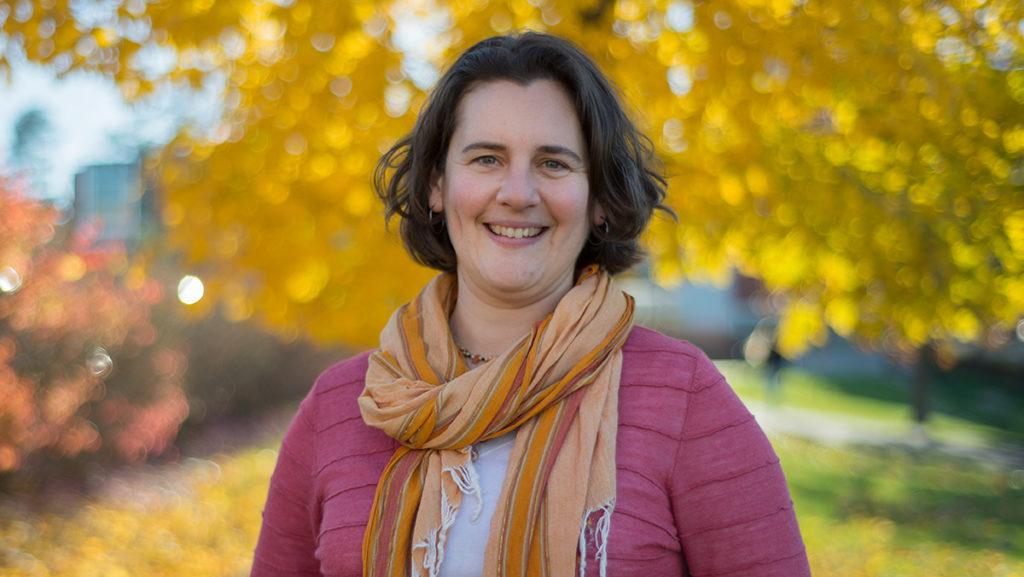Ithaca College has named a new director of the Honors Program, with a little over a month until current director Thomas Pfaff leaves the position.
Alicia Swords, associate professor in the Department of Sociology, will replace Pfaff beginning in the spring semester.
The search for an Honors Program director has spanned almost six months. By October, no candidates had come forward to apply for the position. Now, Swords has stepped in with a three-year contract to take his place.
This comes after the two most recent directors have voiced concerns about structural problems within the program, stemming from a lack of administrative support for the director role, leading both Pfaff and former director Robert Sullivan to step down from the position.
Staff Writer Sophia Tulp spoke with Swords to discuss how the Honors Program will continue and what motivated her to take the position.
Sophia Tulp: As we reported, there was a lot of uncertainty regarding who would step into this role. When did you start considering the position and how did you decide to take it on?
Alicia Swords: I first got a call, actually, from Danette Johnson. … I believe it was in late September, and I started thinking about it and asked a lot of questions, talked to a lot of different people to learn more about it, and ultimately decided that it felt like a really good fit and a challenge for me. … I made a point to talk with … faculty, especially on the steering committee … and students … to tell me about the program. So I really thought it was important to do my homework and learn what I could about the Honors Program before making decisions.
ST: The Honors Program is incredibly interdisciplinary and encompassing of so many aspects across campus. Can you tell me how your own background will contribute to the nature of the Honors Program at Ithaca College?
AS: My teaching and research are in the areas of social movements, social change and community–based research. … I teach research methods in sociology and also coursework in global sociology. … A key thing that I think is important to say is I think I’m really well-positioned to contribute to the civic engagement component … with really strong community connections and a decade or more experience in service learning and community-based research and work in the areas that the Honors Program includes.
ST: Are you interested in reinstating the civic engagement component of the Honors Program? Because right now, with what happened with the office in the fall, it’s currently not in place this semester.
AS: Yeah, and I think it’s not just me. The faculty steering committee, the provost’s office and I are all in agreement that the connection between honors and civic engagement is really important and is a priority. I’m very committed to really rebuilding that connection and that component.
ST: What are your goals for the Honors Program? Is there anything in particular you are interested in creating or strengthening?
AS: I really want to build on the recent work by Tom Pfaff, by the honors steering committee, of prior directors and programs, and the real commitment we have among faculty and students. … It means really working with the whole team … towards a smooth transition. … In the spring, I plan to focus on admissions and among the first meetings that we’ve scheduled is with … admissions to discuss strategic recruitment plans including increasing the diversity of the Honors Program.
ST: Two previous directors, Thomas Pfaff and Bob Sullivan, have publicly stated that they left the position due to a lack of support by administration for the role. Is this a concern for you? Have you had discussions about this?
AS: Absolutely. I’ve had extensive conversations with Tom and Bob about the program and about its resourcing, and conversations as well with the faculty steering committee and the provost’s office. I think in terms of resources, there may be discussions to have, and there may be some creativity required, but I think it’s pretty clear that even with economic uncertainty … in higher education, … the practices that the Honors Program includes … are all the more important. … I think it’s really important to be clear that this program, because of the high-impact practices that it involves, really requires strong support, and I think the experiences that Bob Sullivan and Tom Pfaff have had are really important, and they are going to inform me in the work that I do here. Everybody wants to learn from that experience, and it may take some discussions and debate to figure out how to implement the support that’s needed.
ST: You have a little over a month to learn the job. How does this transition work, and how will you adjust to the amount of responsibilities that Tom had?
AS: For now, it means a number of meetings, and I get to do a whole lot of homework and research in terms of reading materials and talking with people and having meetings with a number of different offices and groups around campus. I think it’s clearly not the ideal scenario to be doing that while teaching. … But given what we’ve got, I think we are going to do the best that we can.








